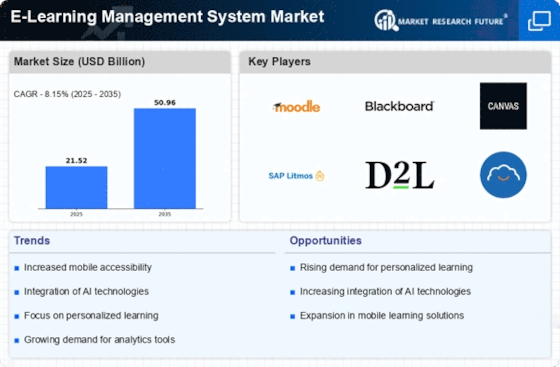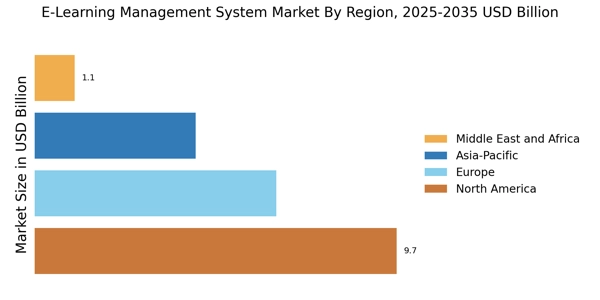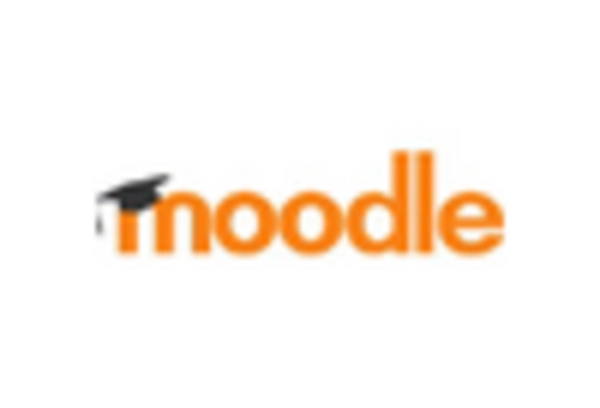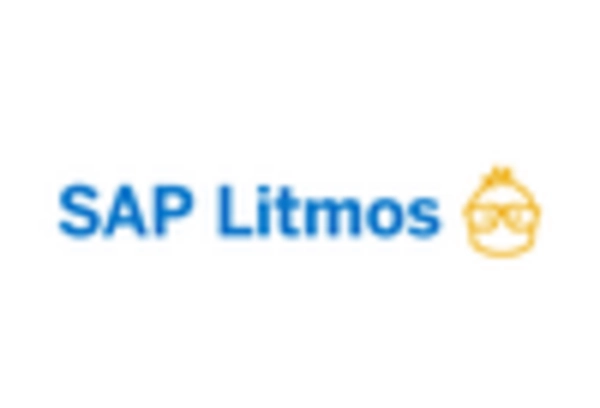Growing Emphasis on Lifelong Learning
The E-Learning Management System Market is significantly influenced by the growing emphasis on lifelong learning. As the workforce evolves and industries undergo rapid changes, individuals are increasingly seeking opportunities to upskill and reskill throughout their careers. This trend is reflected in the rising enrollment in online courses and training programs, as professionals aim to remain competitive in the job market. Data indicates that over 70% of employees express a desire for continuous learning opportunities, highlighting the demand for flexible and accessible educational solutions. Consequently, organizations are investing in e-learning platforms to facilitate ongoing professional development. This shift towards lifelong learning not only benefits individuals but also enhances organizational performance, making the E-Learning Management System Market a critical component of workforce development strategies.
Expansion of Corporate Training Programs
The E-Learning Management System Market is experiencing a notable expansion in corporate training programs. Companies are increasingly adopting e-learning solutions to enhance employee training and development initiatives. This shift is driven by the need for cost-effective and scalable training methods that can accommodate diverse employee needs. Data suggests that organizations that implement e-learning solutions can reduce training costs by up to 50% while improving knowledge retention rates. Furthermore, the flexibility of e-learning allows employees to engage in training at their own pace, leading to higher completion rates. As businesses recognize the value of investing in employee development, the demand for e-learning management systems is expected to grow. This trend underscores the importance of the E-Learning Management System Market in fostering a skilled and adaptable workforce.
Technological Advancements in E-Learning
Technological advancements play a pivotal role in shaping the E-Learning Management System Market. Innovations such as artificial intelligence, machine learning, and virtual reality are transforming the way educational content is delivered and consumed. These technologies enable personalized learning experiences, adaptive assessments, and immersive training environments, which enhance learner engagement and retention. For instance, AI-driven analytics can provide insights into learner performance, allowing educators to tailor their approaches accordingly. The integration of such technologies is expected to drive the e-learning market's growth, with estimates suggesting a compound annual growth rate of over 20% in the coming years. As institutions and organizations increasingly recognize the value of these advancements, the E-Learning Management System Market is likely to witness a substantial influx of investment and innovation.
Rising Demand for Remote Learning Solutions
The E-Learning Management System Market experiences a notable surge in demand for remote learning solutions. This trend is driven by the increasing need for flexible education options that cater to diverse learning styles and schedules. As educational institutions and corporate training programs seek to adapt to changing environments, the adoption of e-learning platforms has become essential. According to recent data, the e-learning market is projected to reach a valuation of approximately 375 billion USD by 2026, indicating a robust growth trajectory. This demand is further fueled by advancements in technology, which enhance the accessibility and effectiveness of online learning. Consequently, the E-Learning Management System Market is poised for significant expansion as organizations invest in innovative solutions to meet the evolving needs of learners.
Increased Focus on Compliance and Regulatory Training
The E-Learning Management System Market is witnessing an increased focus on compliance and regulatory training across various sectors. Organizations are recognizing the importance of ensuring that employees are well-versed in industry regulations and standards to mitigate risks and enhance operational efficiency. This has led to a surge in demand for e-learning solutions that provide comprehensive training programs tailored to specific compliance requirements. For instance, industries such as healthcare, finance, and manufacturing are investing in e-learning platforms to deliver timely and effective training to their workforce. The market for compliance training is projected to grow significantly, with estimates suggesting a potential increase of over 15% annually. As organizations prioritize compliance and risk management, the E-Learning Management System Market is likely to expand in response to these evolving needs.

















